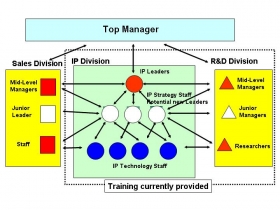Topics
The Japan Times introduce JIPA's IP Leader training
Nurturing Japan’s IP leaders
Practical JIPA training aims to produce players for world stage
Established in 1938, the Japan Intellectual Property Association is active in personnel training. In 2006 alone, more than 1800 employees of its corporate members attended JIPA seminars.
Most recently, the JIPA’s focus has been to nurture mid-level managers well versed on IP issues,” next-generation leaders who can think and act globally as representatives of Japan while giving precise advice to top managers within their companies,” noted Hideo Doi, secretary general of the JIPA.
Starting from autumn 2004, a seven-month special course to train IP leaders has been held annually under the guidance of Hitotsubashi University professor Ikujiro Nonaka. Fifteen specially selected participants from various companies attend this course every year. It compromise of three units. Unit one starts with an intensive, three-day study of the overall issues of IP. This is followed by the second unit, which runs for six months. Participants are divided into three groups, and exchange views, hold discussions and advise each other on how they will need to change and adapt to handle the growing IP demands. Finally, in the third unit, the best proposals are taken back and presented to their company presidents as the outcome of the seminar.
Numerous favorable comments have been received from participants, such as “the course has expanded my views, and has stimulated me to become a true IP manager.” Many also noted, “The course provides the precious opportunity of getting to know many people from various other industries that you would never have the chance of meeting otherwise.”
To develop future potential IP managers, a three-month special seminar also started in autumn 2006. “This course aims to develop personnel who can make creative proposals to take on IP issues as future managers,” explained Doi. Fifteen junior-level employees in their 30s are chosen for this course. Also comprising of three units, they are first given lectures on basic case analysis and management analysis tools. The participants then use the knowledge they learned in the first unit to analyze actual business cases. Finally, in the third unit, they make IP strategy proposals and have group sessions.
Well aware of the importance of training R&D prople, the JIPA also has started to give ad hoc seminars to young, new technicians who have just started working so that they become aware of how IP is related to their R&D activities. The training for the technicians is fully customized, and also gives advice on how to create documents on their new inventions so that they can be properly passed on to the IP divisions for registration.
“What we still haven’t done is organize training for sales people and the very to managers. This is tough to do because salespeople have difficulty rejecting clients even in situations that obtrude on their IP rights. As for top-level managers, change itself is a big challenge. Their mind-sets may be too rigid and they may be incapable of accepting new IP ideas,” said Doi.
The JIPA is nevertheless ambitions in promoting its personnel training activities, and has a long-term perspective of improving the overall IP level of Japan in the years to become. “By constantly training 15 potential IP managers every year. We hope to produce 10 true leaders who can really represent and speak global arena in 10 years’ time,” concluded Doi.
The Japan Times April 18, 2007
[Update 2007-04-23 ]

